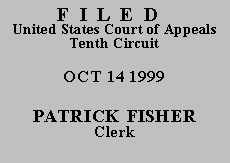

| FERNANDO RIVERA-ESQUIVEL, |
|
Before BRORBY, EBEL, and
LUCERO, Circuit Judges.
After examining the briefs and appellate record, this panel has determined
unanimously that oral argument would not materially assist the determination of
this appeal. See Fed. R. App. P. 34(a)(2); 10th Cir. R. 34.1(G). The case is
therefore ordered submitted without oral argument.
Appellant Fernando Rivera-Esquivel appeals the district court's decision dismissing his petition for a writ of coram nobis. In his writ, Mr. Rivera-Esquivel seeks to vacate his conviction on grounds of ineffective assistance of counsel. We affirm the decision of the district court.
In March of 1993, federal agents at a border patrol check-point arrested Mr. Rivera-Esquivel after discovering fifty-seven bundles of marijuana concealed in the truck he drove. After agents advised Mr. Rivera-Esquivel of his rights, he admitted knowing the truck contained the marijuana. Thereafter, Mr. Rivera-Esquivel pled guilty to a charge of possession with intent to distribute more than fifty kilograms of marijuana. The district court sentenced Mr. Rivera-Esquivel to thirty months imprisonment and three years supervised release.
After Mr. Rivera-Esquivel completed his prison sentence and probation, the Immigration and Naturalization Service ordered his deportation to Mexico based on his criminal conviction. In an effort to avoid deportation, Mr. Rivera-Esquivel filed his petition for a writ of coram nobis, seeking to vacate his guilty plea and conviction. In support of his petition, Mr. Rivera-Esquivel alleged ineffective assistance of counsel because his attorney failed to: (1) research immigration law concerning the immigration consequences of pleading guilty; (2) attempt a plea-bargain minimizing the adverse immigration consequences; and (3) advise him of the deportation consequences of pleading guilty. Mr. Rivera-Esquivel claimed he would not have pled guilty if he had known about the possibility of deportation.
The government filed a motion to dismiss, arguing Mr. Rivera-Esquivel's petition for a writ of coram nobis was an inappropriate vehicle for the relief requested because the issues he presented involved legal and not factual questions. The district court denied the government's motion to dismiss, finding a writ of coram nobis "remains viable in the criminal context under the All Writs Act, particularly where the sentence has been served."(1)
The district court then considered the merits of Mr. Rivera-Esquivel's petition and dismissed the appeal. Relying on our decision in Varela v. Kaiser, 976 F.2d 1357 (10th Cir. 1992), cert. denied, 507 U.S. 1039 (1993), the district court determined the voluntariness of Mr. Rivera-Esquivel's plea depended on whether his counsel's advice was within the range of competence demanded of attorneys in criminal cases. Because we have held this advice does not extend to the collateral consequences of a guilty plea, including the possibility of deportation, 976 F.2d at 1358, the district court determined counsel's alleged failure to advise Mr. Rivera-Esquivel of possible deportation consequences did not amount to ineffective assistance of counsel.
On appeal, Mr. Rivera-Esquivel contends the district court erred in finding deportation was not a direct consequence of a guilty plea in light of new laws requiring deportation for specified criminal offenses. Specifically, Mr. Rivera-Esquivel argues that because certain provisions of the Illegal Immigration Reform and Immigrant Responsibility Act of 1996 and the Antiterrorism and Effective Death Penalty Act of 1996 require deportation, deportation is no longer a collateral, but a direct consequence of pleading guilty.
We review de novo the district court's determination of legal issues in denying a petition for a writ of error coram nobis. See Blanton v. United States, 94 F.3d 227, 230 (6th Cir. 1996). While Mr. Rivera-Esquivel's legal argument on the passage of new legislation is novel, it misses the point. Regardless of whether the new Acts in some way change deportation from a collateral to a direct consequence of pleading guilty, Mr. Rivera-Esquivel brings his petition for writ of coram nobis under the auspices of an ineffective assistance of counsel claim arising from his counsel's conduct in 1992 at the time of his guilty plea and well before passage of both Acts. At that time, his counsel was under no duty to advise Mr. Rivera-Esquivel of the collateral consequence of his deportation. See Varela, 976 F.2d at 1358. For the same reasons, no ineffective assistance claim exists for Mr. Rivera-Esquivel's counsel's alleged failure to research the immigration consequences of pleading guilty.
Accordingly, the judgment of the district court is AFFIRMED.
Entered by the Court:
WADE BRORBY
United States Circuit Judge
*. This order and judgment is not binding precedent except under the doctrines of law of the case, res judicata and collateral estoppel. The court generally disfavors the citation of orders and judgments; nevertheless, an order and judgment may be cited under the terms and conditions of 10th Cir. R. 36.3.
1. The All Writs Act, 28 U.S.C. § 1651(a), provides federal courts with authority to grant writs of coram nobis in instances where, like here, a habeas corpus writ is an inadequate remedy because Mr. Rivera-Esquivel is no longer serving his sentence or in custody. See Carter v. Attorney General, 782 F.2d 138, 141 (10th Cir. 1986). We note a writ of coram nobis is an extraordinary form of relief which we grant only under circumstances compelling such action to achieve justice. Id. (quotation marks and citation omitted).